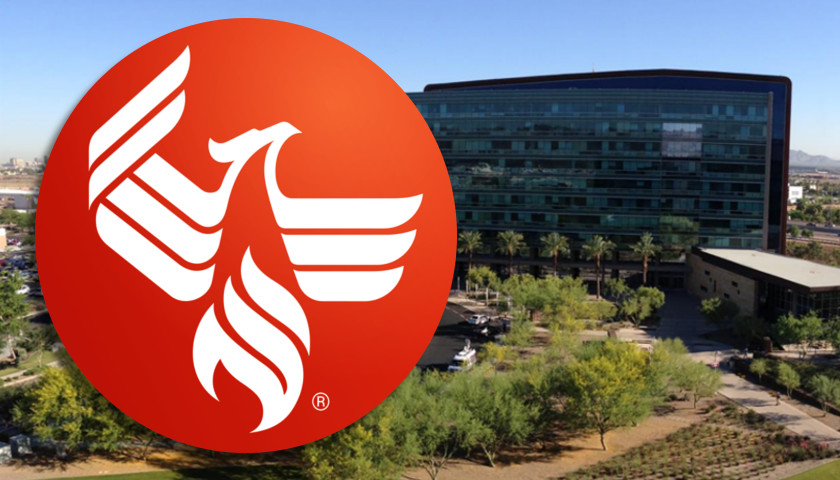by Luke Rosiak
Onetime employees of the University of Phoenix say the for-profit company conducted a potentially multi-billion dollar fraud on taxpayers by deliberately submitting false records to the federal government to enroll unqualified students and cash in on federal student loans.
Few single companies have the potential impact on the federal budget as the University of Phoenix (UOP). Attendees owed $36 billion in student loans, according to a 2015 Brookings Institute study. Only 28% of UOP borrowers have “paid at least one dollar of the principal balance on their federal loans within three years of leaving school,” according to the Department of Education (DOE) in 2017.
In legal documents and in interviews with the Daily Caller News Foundation, current and former employees described a corporate culture where “enrollment counselors” toil in call center-like environments. They said they were pressured to get anyone they could — including non-high school grads, who are generally supposed to be ineligible — to sign up for college, netting federal grants for the students and federal student loans that lined the company’s bottom line.
 Some students are homeless and seemed unaware that they were being enrolled in college by salesmen, while others were aware of what they were doing but had no desire to actually be college students, the current and former employees said.
Some students are homeless and seemed unaware that they were being enrolled in college by salesmen, while others were aware of what they were doing but had no desire to actually be college students, the current and former employees said.
UOP is a for-profit college owned by Apollo Global Management, a private equity firm whose chairman, Leon Black, was close with Jeffrey Epstein, according to Bloomberg.
At its peak in 2010, the online school had 470,800 students, according to Dahn Shaulis, an education expert who compiled the figures from investor disclosures. Only 15% of UOP students actually graduate within six years, according to DOE data.
Seventy-five percent of black students who attended for-profit college but did not complete it defaulted on their student loans, the Center for American Progress found.
As politicians like former Harvard educator Elizabeth Warren discuss proposals for free college and reducing student debt, largely overlooked is the outsized role that colleges with no admissions criteria — especially the enormous for-profit college — has played in gobbling up billions of dollars, allegedly sometimes by using students who barely seem interested in an education, Shaulis said. For-profit colleges have played both political parties to keep it that way.
‘They say: If you’ve got a pulse and a Pell, you’re in’
In a lawsuit that settled in April, a former UOP enrollment counselor in Ohio, Arthur Green, described techniques he says the school uses.
The school allegedly targets impoverished people, some of whom express little desire to get an education, and encourages them to sign up for the college, which has no testing or admissions criteria, Green said. UOP sometimes emphasized that people would receive a laptop if they signed up.
As part of Green’s case, numerous enrollment counselors said they were pressured to admit and secure loans for students who didn’t have a high school degree or GED by submitting applications that said they did. The company previously acknowledged as part of another lawsuit that it performs no verification, but merely records whatever answer applicants put on a form.
“People wonder, how does one college get 500,000 students? What is the secret sauce?” Green told the DCNF. “And it’s simple: No GED, no problem. They say: If you’ve got a pulse and a Pell, you’re in,” he said, referring to eligibility to receive the federal Pell Grant.
The Department of Education paid UOP $1.2 billion in Pell Grants alone between 2009 and 2015, according to USAspending.gov.
Green’s lawsuit says UOP monitors employees’ emails, punishes whistleblowers and falsifies documents in its relentless pursuit of federal student loan cash.
“In April 2011, UOP learned by monitoring emails that [Green] was considering ‘blowing the whistle’ on UOP’s illegal activities relative to their knowing enrollment of and falsification of loan documents for individuals that did not qualify for financial aid,” it says.
“Within hours, UOP ordered every employee of UOP to ‘power down’ their computers ‘for routine maintenance,’” it continues. “When the employees were allowed to return to their computers, various evidence of UOP’s intentional violation had been removed.”
Waiting for a check
So-called students have learned to turn college loans into cash, with education sometimes simply an afterthought, UOP employees told the DCNF.
The biggest appeal for many is the Pell Grant from the federal government, they said. As a grant rather than a loan, it goes straight to the student in the form of a check that does not have to be paid back.
Pell Grants amount up to approximately $9,500 for freshmen and $5,000 per year after that. Meanwhile, the school also collects subsidized federal loans in the student’s name — loans that they are obligated to repay, but which at UOP are often defaulted on at a loss to taxpayers.
UOP’s 3-year default rate is 12.8%, compared to 2.1% for the University of Maryland, for example, but Shaulis said the measure understates the true value since students are given forebearances and deferments that prevent the category from being triggered even though they aren’t paying.
Employees told the DCNF that UOP is structured so that all but the most unmotivated students can hang on for long enough to bill the federal government.
The money arrives after five weeks, and at UOP, students take a single class at a time, five weeks each. Their first class is about how to take online classes, and the second one is a remedial class about how to use a computer.
“So you just take an online class that about how to take online classes and then you’ll get $5,000. And if you know basic English you can hang on and get another $5,000. All the students will request the maximum loans and our paperwork is set up that way, so they’re super happy,” said a current enrollment counselor who spoke on condition of anonymity to protect her job, and who the DCNF will refer to as Jane.
Attendance is mandatory to get student loans, but UOP simply requires students to post any response to an online message board twice a week, Jane said. She said respondents’ academic work often appears to be sent from cellphones and uses texting jargon.
“Plenty of other people see how easy it is the first week, so they say, ‘I’ll stick with this. It’s easy to post two sentences per week,’” she told the DCNF. “Sure enough the check goes to their account and you see the drop-off right away: Around week five, as soon as the check is in their hands, they don’t post any more.”
The money is disbursed twice a year, and “some of them keep going until they get the second disbursement,” Jane said. “They’re not actually taking college seriously or even hardly thinking about it. They’re attending so they can get $4,000 to $5,000 of financial aid and buy a car and do whatever they want to do.”
Call centers
The machine is fueled by enrollment counselors who make hard-sales pitches to convince people to enroll.
An Ohio enrollment counselor, Sequitha Van DeHorst, said in a statement filed for Green’s lawsuit that many people filling out applications don’t even realize they’re applying for college.
“I was hired under the impression that I would help students change their lives. Most of the student thought they entering [sic] their information to get a free ipod or laptop not knowing they would be contacted about enrolling into school at UOP. Some students thought they were applying for a job,” she wrote.
While other colleges seek to admit the most qualified students, at UOP, there is no admissions criteria or testing, and enrollment specialists who garner the best statistics do so by digging into the bottom rungs of society, Green said. Some are homeless students who are told they can have a better life if they fill out a form.
“You’re a car salesman without the asset. We trade dreams for cash,” he told the DCNF.
Jane said, “There’s tremendous pressure. I have to pump out 15 enrollments a month or else I’ll get fired. Results are all that matter. I’ve got to do whatever I need to do to get them into the system.”
“UOP does no cross-checking of HS diplomas or GEDs, zero. You don’t need proof. There’s communities of people who know that and go to UOP for that reason … to pick up a financial aid check,” she said.
This is something that’s hard for outsiders to understand. “Judges go to Harvard or whatever and they can’t understand that a college would let someone in who can’t read. People say, ‘But wouldn’t someone check?’ No, they don’t. They don’t give a shit.”
If one enrollment counselor declines to enroll a student because they do not have a GED, they are often “re-routed” to a different counselor until one lets them in, employees said in the lawsuit and to the DCNF.
Enrollment counselor Travis Edward Wills of Perry, Ohio, said in a court document as part of Green’s lawsuit: “Students often requested enrollment more than one time and often spoke to different enrollment counselors.”
Green denied one student for having no GED. Two weeks later, the same student told Wills he had a GED, and he was admitted, according to Green’s lawsuit.
Enrollment counselors subtly guide students to write what they need to on the form, according to Jane.
“Say they say I’m originally from Mexico, I’ve been here for a year,” she told the DCNF. “‘I see that you put that Spanish is your first language. If that isn’t English, you’ll have to take a test. Are you prepared to take a test?’ And they’ll say ‘no’ and I’ll say, ‘OK, go back in and change that.’”
“The threat is constant. If you don’t enroll the student, they’re gonna get rerouted,” Jane said. “One student told the rep, ‘I don’t have a high school diploma. I’m from Haiti. My first language is French.’ The student is then routed to me, and within that hour of talking to the counselor, the student had a GED and English was her first language.”
“We do what’s called a blitz, you call a list of students by a manager, and whoever enrolls them gets credit for that reg,” Jane continued. “If I can put someone in what they call REG status (registered) within three days, I get recognition for that. Does he have a high school diploma? Don’t know, don’t care. There are thousands upon thousands that are attending college who have no business being in school because they didn’t finish high school.”
Green’s lawsuit says UOP managers “train their enrollment counselors and students to falsify the loan applications of students who do not qualify.” The lawsuit names students whose applications managers allegedly told counselors to falsify or look the other way while students did so. Green’s manager Dwane Newsome, the lawsuit claims, told Green he was in “no position to turn away students.”
In another example, a student with the initials D.G. informed enrollment manager Joel Terman “that he did not have a GED or high school diploma. Joel Terman told D.G. to state on the [Free Application for Federal Student Aid] FAFSA that he did have a GED. D.G. stated on the FAFSA form that he had a GED, and, as a result, subsequently received Title IV HEA funding that would not have otherwise been provided,” the lawsuit says.
Feel-good rhetoric
While Green has agreed not to speak about the case, the DCNF interviewed him before he entered into that agreement. Green told the DCNF these students are unlikely to benefit from UOP’s curriculum. “If they couldn’t graduate high school, they’re not going to get anything out of college. If you don’t have the basics, what are you really setting these people up for? It doesn’t matter, its get them in or you’re fired,” he said.
But the for-profit company has hid behind rhetoric around compassion and identity politics to shield itself from criticism of practices that have enriched it at the expense of taxpayers, he said. “You’re going to work under the guise of helping people. What if Enron could have said it was helping people?”
“You hear it all the time: They’re a first-generation college student, they need a special hand. Well, they’re not going to classes and they’re likely going to default on their student loans,” Green said.
The median family income of a UOP student is $18,600, according to Department of Education data for school year 2016-2017. The median student loan debt for UOP students is $9,066 for those who drop out and $32,000 for those who complete a degree.
For-profit colleges and their allies have used publicity campaigns to fend off criticism.
A bare-bones political advocacy group that does not disclose its donors has attempted to position for-profit schools as favorable to conservatives and libertarianism, calling them “institutions that don’t march to the beat of the traditional, and overwhelmingly left-leaning, education establishment,” and saying those highlighting problems want students to “study under the thumb of liberal education activists and their far-left policies.”
Simultaneously, advocates have often highlighted the high percentage of students at for-profit colleges who are low-income racial minorities, saying that as a result, restrictions on for-profit schools’ ability to take federal loans amount to harming minorities.
Green’s lawsuit was filed qui tam, meaning on behalf of taxpayers, similar to a class action. It had the potential to require the university to make sweeping changes. But it was abruptly settled in April for a confidential settlement that most likely only compensated Green, while preventing his evidence from being introduced in other lawsuits or requiring broader reforms.
UOP frequently has departing employees sign confidentiality and non-disparagement contracts, former employees told the DCNF. The legal settlement also bars Green from talking about the issues.
UOP’s press office did not respond to questions from the DCNF.
Little appetite for action from feds
A federal judge slammed the Department of Education (DOE) in July 2016 for ignoring evidence that UOP admits students without GEDs.
Phyllis Price, a 52-year old Texan in a low-wage job who hoped to improve her career, was persuaded by counselors to apply to UOP.
“Price explained to the counselor that she did not graduate from high school. … The counselor nevertheless instructed her to state on the application that she had actually finished school and to fill in the year she ‘should have graduated,’” Judge Stephen Smith wrote.
Price graduated and found that employers were uninterested in her UOP degree, yet she was saddled with $37,000 in student debt.
The law says that if a “student’s eligibility to borrow under this part was falsely certified by the eligible institution … then the Secretary shall discharge the borrower’s liability on the loan.” Realizing that only high school graduates are generally eligible for loans, Price petitioned the DOE for forgiveness. When it refused, she sued.
DOE noted that technically some non-high school graduates can get student loans if it was proven in advance that they had an “ability to benefit” from the degree anyway.
Yet, Smith wrote, DOE produced no evidence that UOP had given such a test or that she had an ability to benefit.
“The agency studiously avoided that issue, never bothering to request the test records from the one place most likely to have them — the school itself. This was not an oversight. For reasons left unexplained, it is Department policy not to ask the school for specific proof of [Ability to Benefit] testing in student loan discharge cases,” he wrote.
DOE simply said that Price had filled out the form saying she had graduated — not mentioning that an employee told her to write that.
The judge noted that the DOE also ignored the fact the UOP does not even attempt to verify whether students’ claims about being high school graduates are true.
It “must be stressed that the final agency decision did not even mention” the fact that the school relied on “self-certification,” he wrote.
Smith ruled that Price’s loans be forgiven — with the cost eaten by taxpayers, not UOP.
Green said there are likely thousands of people in Prince’s exact position. Yet as with Green’s own ruling, the judge’s ruling dealt only with one individual.
Nothing about the ruling required an examination of how many UOP students were falsely represented as high school graduates to draw student loans, or brought them relief, or required UOP to begin verifying applicants’ degrees.
– – –
Luke Rosiak is a reporter at Daily Caller News Foundation.
Photo “University of Phoenix Headquarters” and “Logo” by University of Phoenix.






Pell grants are a blight on society. No real accountability for class attendance nor passing grades. There needs to be better control to allow those who work toward a degree to be helped while sifting out those wanting free money.